Immunohistochemical analysis (IHC research) first appeared back in 1941, but this direction gained its popularity only at the end of the 20th century.
Record content:
- 1 What is this research, cost
- 2 Purpose of the study
- 3 Indications for IHC
- 4 Selected diseases and antibodies used for their diagnosis
- 5 Preparation for research
- 6 Research progress and deadlines
-
7 Decoding the results
- 7.1 What is the norm
- 7.2 Deviation from the norm
- 8 Video about IHC
What is this research, cost
IHC study is a diagnostic method aimed at identifying the exact localization of the tumor component (antigen) due to its binding to antibodies. At the moment, immunohistochemical analysis is widely used in medical institutions of an oncological profile.
Thanks to the widespread introduction of this research method, pathologists were able to accurately understand what type of tumor they are considering.
This method is a more precise diagnostic option and serves for a more accurate diagnosis. It allows you to differentiate the tumor process and more accurately determine which type of tumor belongs to. But it should be noted that this diagnostic method is used not only in oncology, but it is also widely used in infectious diseases.
The diagnostic mechanism is that cells carry many different receptors. When cells begin to acquire new properties for themselves, to change, they release certain receptors. Through immunocytochemistry, the molecular receptor of the cell structure can be recognized. The method is based on the antigen-antibody reaction.
An antigen is a substance that contains protein. He, in turn, is an integral part of the cells of the human body. And it can be contained both in healthy cells and be one of the parts of "atypical" cells and infectious agents.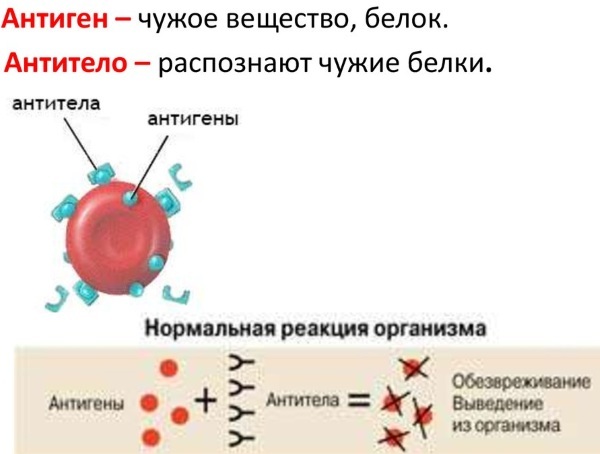
An antibody is a substance that is produced by the body's immune system in response to the detection of an antigen.
If you call the essence of the study in simple terms, then this analysis is a laboratory model of the immune response that occurs in the human body.
With the help of IHC - studies, it is possible to identify:
- Infectious agents (especially viruses).
- Certain cell receptors (which appear in the process of its change).
- Cellular products (immunoglobulins, hormones and enzymes).
Prices for an immunohistochemical study vary depending on the region where the patient wants to do it. On average, the cost of an IHC study is about $ 10,000. rub. And also the cost depends on the indications for the study.
IHC research is a diagnostic method that can also be passed free of charge under the compulsory health insurance policy. But for this, the patient must be hospitalized in the oncological department. Diagnostics can also be carried out in private laboratories or large cancer centers.
Purpose of the study
The purpose of the immunohistochemical study is:
- Assessment of the biological structure of a cell (its growth, the possibility of degeneration into a cancer cell, sensitivity to certain types of anticancer therapy, cell differentiation). The lower the differentiation of the cancer cell, the more unfavorable the prognosis.
- Identification of a pathological process in the early stages of development.
- Determination of the type of therapy (whether surgery is necessary or whether the use of chemotherapy drugs can be dispensed with).
- Assessment of the prognosis for the patient's life from the type of tumor.
- Differentiation of tumors of the hematopoietic system from lymphoid tumors.
- Establishment of tissue belonging (in the case when the tumor does not differentiate histologically).
- Determination of the degree of tumor malignancy.
- Identification of the primary tumor focus (if it is impossible to detect it clinically).
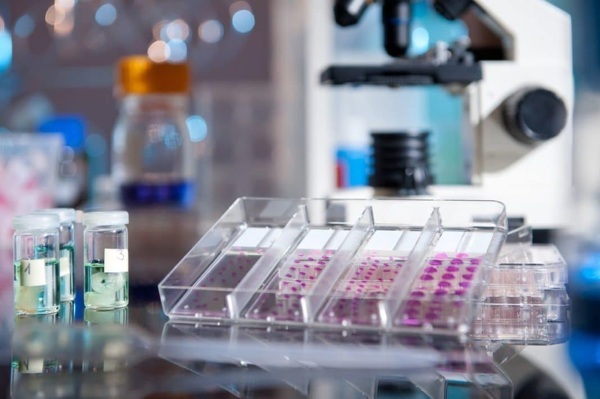
In short, the main purpose of immunohistochemistry is diagnosis, treatment and prevention.
Indications for IHC
The indications for the study are:
- Determination of the degree of malignancy of the tumor process.
- Assessment of the prognosis of treatment.
- Monitoring the effectiveness of anticancer therapy.
- Suspicion of cervical cancer and differential diagnosis of precancerous conditions.
- Determination of the sensitivity of tumor cells to certain types of therapy.
- Diagnosis of neuroendocrine tumors.
- The absence of a primary tumor focus and the search for its metastases.
Selected diseases and antibodies used for their diagnosis
The main malignant tumors, in the diagnosis of which the immunohistochemical method is used:
- Lung cancer.
- Cervical cancer.
- Mammary cancer.
- Melanoma (skin cancer).
- Prostate cancer.
- Stomach cancer.
- Lymphomas.
Melanoma is a malignant tumor arising from melanocytes. Most often arises from a benign nevus (birthmark), but it can be localized in other places. For example, melanoma of the nasal mucosa, melanoma of the nail bed, melanoma of the mucous membrane of the eyes are isolated. But most often the classic form is found - this is the degeneration of a nevus.
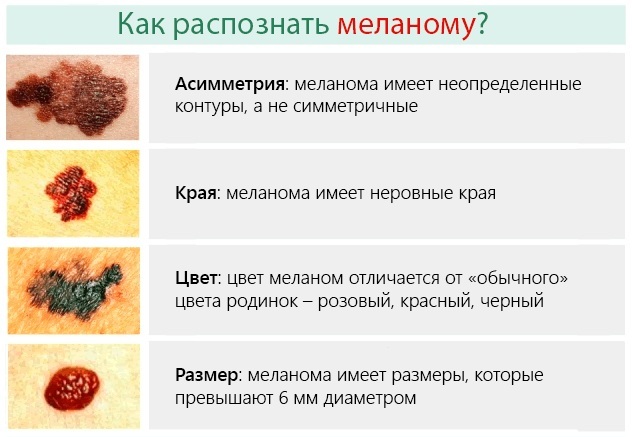
Melanoma differs in its degree of malignancy from other tumors. And it is characterized by its high degree, it can spread metastases throughout the body in a short period of time. The favorite localization of melanoma metastases is the brain, skeletal system, lungs and gastrointestinal tract. In addition, regional lymph nodes are also affected.
Melanoma can be suspected by a change in the color, shape and size of the mole. With the development of the tumor process, the mole changes, its edges become uneven, the mole begins to grow rapidly. A change in its color is observed, the color becomes darker. And also a mole can hurt, bleed. Often, patients complain of increased itching of the skin in the area of the nevus.
The diagnosis of melanoma is a clinical examination of the mole, its biopsy. Immunohistochemistry is often used. It is especially important in the absence of a primary focus of melanoma.
Cases in clinical practice are described when the patient has not been able to establish the primary focus. But at the same time, there was a tumor formation, in the structure of which melanoma cells were identified.
In the diagnosis of melanoma, the following markers are distinguished:
- S-100. This antigen is found only in melanoma. Its absence or presence makes it possible to differentiate melanoma from other similar skin tumors.
- R. Assesses the degree of division of malignant cells.
- Ki-67. Its presence makes it possible to assess the degree of proliferation of tumor cells. Thus, it allows the physician to assess the prognosis for the patient's life. The differentiation of tumor cells is assessed, the lower it is, the worse the prognosis.
- HMB-45. With this marker, the function of melanocytes can be assessed.
-
bcl2. With its help, you can assess the risk of tumor metastasis to other organs and tissues.
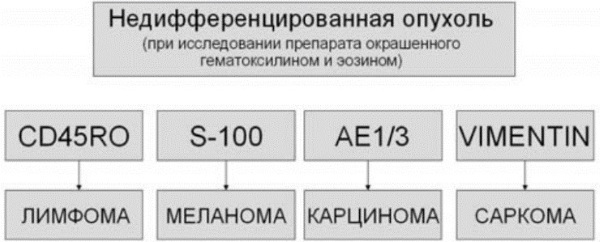
Breast cancer ranks 3rd among all cancers based on their prevalence. It is a tumor formation in the tissues of the mammary gland. In women, this pathology occurs much more often than in men.
The main symptoms are the appearance of swelling in the area of the mammary gland, discharge from the nipples, an increase in axillary lymph nodes, and an increase in body temperature.
The main method for detecting a tumor process is a biopsy followed by an immunohistochemical study.
IHC is the main study that is prescribed to establish an accurate diagnosis. This technique allows you to reliably determine the stages of the disease and its severity, as well as predict the degree of success of medical therapy.
Major markers of breast cancer:
- PR, ER. They are specific proteins that respond to an increase in hormone levels in the body. Most types of breast tumors are hormone-dependent.
- Ki 67.
- HER-2 / neu.
- Estrogen - receptor.
- Progesterone - receptor.
We can say that there is no special preparation for the analysis, since immunohistochemical study is carried out on the affected tissue area, which was taken from of the patient during the biopsy.
Lung cancer is the most common cause of death among other cancers. Most often found among men.
The main symptoms that may indicate the development of a pathological process are prolonged cough without signs of an infectious process, shortness of breath, increased body temperature at night time.
As a rule, it has a latent course for a long time, like most other oncological diseases. It is diagnosed by chance, during a fluorographic study. In some cases, at the time of diagnosis, a lung tumor may have a stage at which the process of metastasis is actively progressing.
The initial prognosis of lung cancer is poor for the patient.
In the diagnosis of a lung tumor, one cannot do without the use of immunohistochemical analysis. Specific markers also differ from tumor species.
The main markers of lung cancer:
- An increase is observed in small cell lung cancer.
- Cytokeratin 14, Cytokeratin 5/6, CEA, EGFR. Their presence is observed in squamous cell lung cancer.
- EMA, cytokeratin. It is detected with adenocarcinoma.
- C The presence of this marker is observed in small cell lung carcinoma.
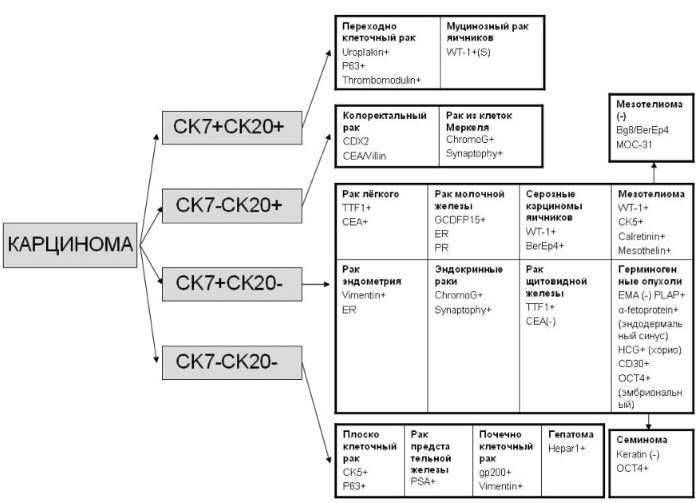
Prostate cancer occurs in men mainly after the age of 50. And it occurs almost as often as lung cancer. Due to the fact that cancer of the prostate gland may not have any clinical symptoms, the main role is given to diagnostic methods. Including diagnostic measures in patients at risk.
Major markers of prostate cancer:
- PSA.
- Androgen receptor.
- Ki-67.
IHC study is one of the main tests for suspected lymphoma.
Lymphomas are a group of malignant tumors of the lymphatic system. Distinguish between Hodgkin's lymphoma (lymphogranulomatosis) and non-Hodgkin's lymphomas. Lymphogranulomatosis is prognostically a more favorable type of lymphoproliferative diseases.
Tumor cells of this type of oncology respond best to chemotherapy and have a high level of differentiation. The peak incidence occurs in children and young people (about 20 years).
The first symptoms of lymphomas are swollen lymph nodes. Especially the supraclavicular and cervical. And also there is an increase in the lymph nodes of the mediastinum. In addition, there is an increase in body temperature, itching and profuse night sweats.
The etiological factors in the development of lymphomas are viral diseases, including the Epstein-Barr virus and a number of others.
The main diagnostic method in modern hematology oncology is the immunohistochemical method of research. This allows you to identify the type of tumor cells, the degree of their malignancy. And also with the help of this method, lymphomas can be differentiated from other types of lymphoproliferative diseases.
Major markers of lymphomas:
| Name | List of markers |
| Hodgkin's lymphoma | CD20, CD3, CD15, CD30, CD45, EMA. |
| Non-Hodgkin's lymphomas | CD20, CD3, CD5, CD43, CD10, BCL6, BCL2, cyclin D1 |
Stomach cancer is a malignant neoplasm of the stomach lining. It occurs almost as often as lung and breast cancer. Differs in a high degree of malignancy. The main peak of the incidence occurs in old age after 60 years.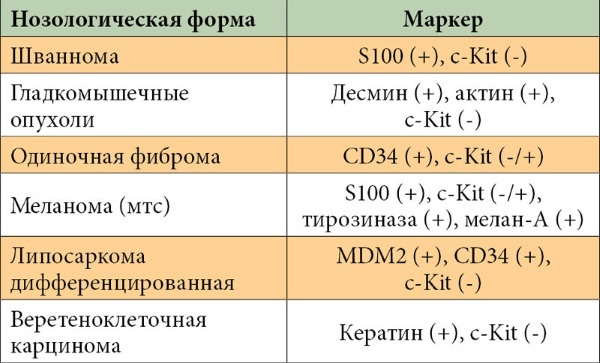
Pain in the epigastric region is often the first symptom of stomach cancer, but sometimes it can be asymptomatic. Stomach cancer can develop from precancerous conditions such as stomach ulcers.
IHC study in the case of stomach cancer serves as a clarifying method. Since a histological examination of a tumor always gives comprehensive data.
Immunohistochemical analysis is needed if the primary focus of the tumor is not detected (with metastatic lesions of the stomach) or, when histological examination cannot completely differentiate a stomach tumor from other tumors of the gastrointestinal tract.
The main markers of gastric cancer: CK18, CK19, CK7, CK20.
Chronic endometritis is an inflammatory process in the lining of the uterus (endometrium). The occurrence of endometritis is closely related to exposure to infectious agents. Infection of the uterine mucosa occurs as a result of childbirth, abortion and other interventions on the pelvic organs. Infection of the endometrium from other organs is also possible.
Inflammation leads to the development of pathological changes in the reproductive organs and, in some cases, to infertility.
During the diagnosis, the following antibodies are detected:
- C20.
- CD56.
- CD138.
- HLA-DR.
Cancer of the cervix is the main danger to the reproductive system of women and ranks second in frequency after breast cancer in women. Cases are described when the patient was diagnosed with two types of oncology.
Symptoms of cervical cancer are prolonged menstrual bleeding, lower abdominal pain. Often, cervical cancer degenerates from erosion, which is a precancerous condition. Not the least role is played by the human papillomavirus, which can provoke the development of the disease (when an oncogenic strain is detected).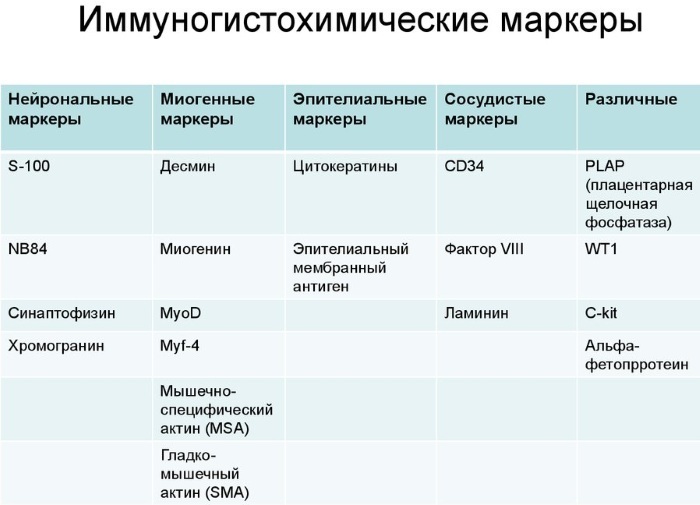
Main markers:
- Estrogen receptor.
- Progesterone receptor.
- Determination of the viral profile.
- KI 67.
Preparation for research
There is no specific preparation for the patient.
Research progress and deadlines
IHC research is a method that requires painstaking work. The affected material is taken from the patient's body by biopsy or trepanobiopsy (if leukemia is suspected), as well as from the material obtained during the operation.
You can also take the discharge with a scraping. In order for the diagnosis to be reliable, all material is divided according to the location from which it was taken and marked before being sent to the laboratory.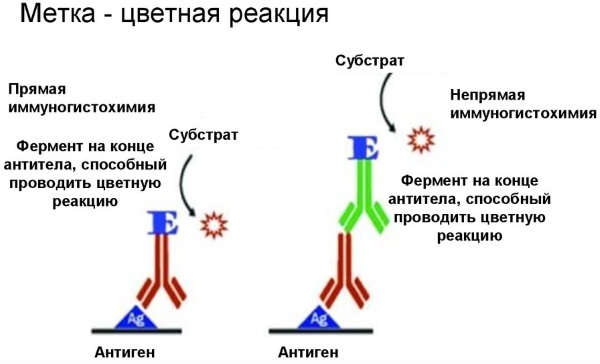
With this analysis, you can also study various liquids. But in this case, the analysis is called the immunocytochemical method.
As soon as possible after collection, the material should be delivered to the laboratory. Since when staying in the air, cells lose their antigenic properties.
After sampling, the material is prepared for further research, degreased and the tissue is enclosed in paraffin blocks. Then the thinnest sections are made. Then the preparation is placed in a special staining preparation. After that, the finished product is transferred to the doctor - pathologist for further study.
Staining tissue samples will highlight certain antibodies that are sensitive to this type of tumor. After that, the doctor describes the morphological structure of the material, lists the number of cells seen and the degree of their staining. And then it issues a conclusion with a description.
The duration of the study depends on the laboratory and its workload. But, as a rule, the process takes about 10 days. But the time period can also change, on average, the fate of this study is from 7 to 14 days.
Decoding the results
When decoding the analysis, the number of cells that were found in the original material, as well as the degree of their staining, is taken into account.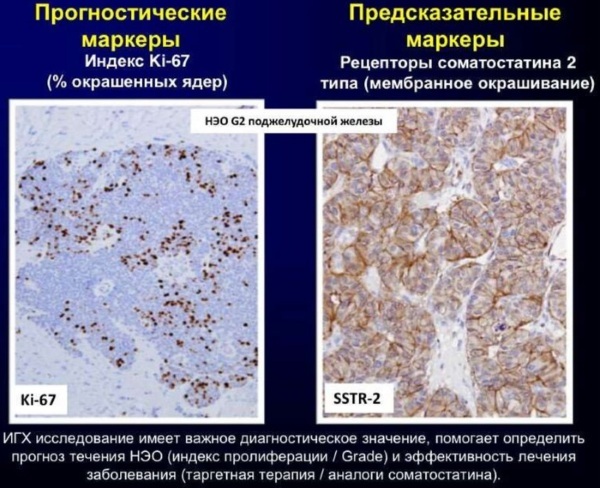
What is the norm
Normally, the number of cells that are sensitive to certain antibodies should not be. In this case, the assessment of the number of cells ranges from 0 to 1 point. This indicates the absence of pathology.
Deviation from the norm
Abnormalities are considered to be the detection of cells sensitive to certain antibodies. Their number is estimated from 2 to 3 points.
When assessing the proliferative activity of cells, a deviation from the norm is considered to be indicators above 16%.
It is impossible to imagine modern medicine, and especially oncology, without an immunohistochemical method.
Despite the fact that now there are even more modern methods, this analysis remains one of the most important in clinical practice. Without IHC research, there will be no more accurate diagnosis, and this will invariably lead to misdiagnosis and complications during treatment.
Video about IHC
About immunohistochemical studies:



